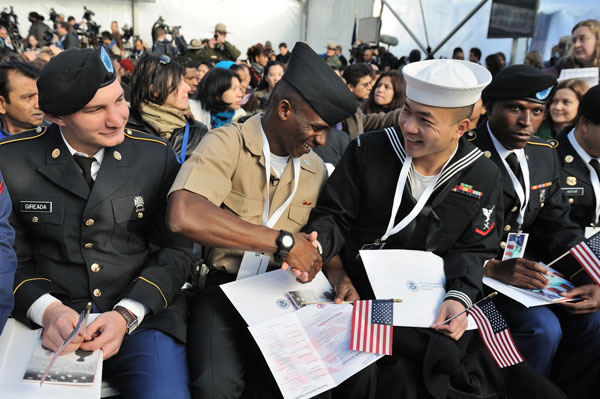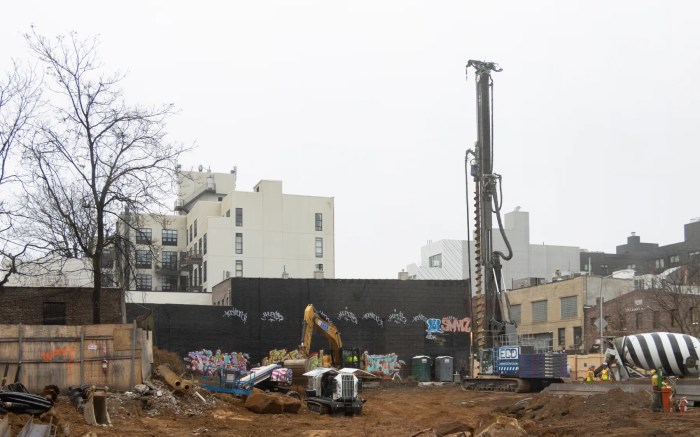
By TERESE LOEB KREUZER | Olga Hernandez looked up at the cloudless sky and the sun shining on the Statue of Liberty in New York harbor. “”It’s a crisp day for a new beginning,” she said to her husband, José.
“It’s great that the ceremony coincides with the anniversary!” he replied.
They were aboard a ferry bound for Liberty Island where José, 35, who was born in Peru, was to be one of 125 people to become a naturalized American citizen. He said that he had spent most of his adult life in the United States and that Olga and their two daughters were already Americans.
It was also the 125th anniversary of the unveiling of the Statue of Liberty on Oct. 28, 1886, which was celebrated with parades, a flotilla of 300 boats and U.S. President Grover Cleveland himself accepting the statue as sculptor Frédéric Bartholdi pulled a French flag away from the lady’s face to mark her debut as a token of French-American friendship and a symbol of liberty.
It wasn’t until fifteen years later that the statue took on a new meaning. By then neighboring Ellis Island had opened and a flood of immigrants were debarking there for medical and legal processing. In 1903, a plaque inscribed with part of a poem by Emma Lazarus called “The New Colossus” was affixed to the statue’s base. “Give me your tired, your poor,” Lazarus wrote, “your huddled masses yearning to breathe free, the wretched refuse of your teeming shore. Send these, the homeless, tempest-tost to me. I lift my lamp beside the golden door.”
On this special anniversary for the statue, there were speeches, music and a birthday cake, but nothing that seemed more appropriate and relevant than the naturalization ceremony.
The 125 candidates for American citizenship came from 46 countries. Thirteen of them were serving in the U.S. armed forces. They included Jhanniny Marine, 22, from Colombia, Zuyu Wu, 24, from China and Rufai Adeniyi, 31, from Nigeria.There were 35 people from the Dominican Republic, 15 from China, 6 from South Korea, one each from Albania, Belize, Burkina Faso, Cameroon, Canada, Spain, Turkey and Venezuela.
Among the others, Martha Friedlander, 49, a make-up artist, was born in Brazil, the daughter of a man who had fled there from Nazi Germany and a Brazilian mother. Heloise Zinger, 30, who works in the restaurant business, was born in France. Fahmida Islam, 26, came from Bangladesh and attended the ceremony with her two-year-old daughter, Faiza, who is already an American citizen because she was born here.
On the boat going to the island, Linnea Stuart, who works for U.S. Citizenship and Immigration Services interviewing potential candidates said that she had been to 50 naturalization ceremonies. “I get emotional every time,” she said. “It’s their first day and their first second of being U.S. citizens. You’re helping somebody take an important step in life.” She said that both of her parents were immigrants — her mother, from Peru and her father, from St. Kitt’s. “They came for a better life for their family — like everyone else who comes here.”
In a tent packed with friends, family, dignitaries and members of the press, the 125 candidates for American citizenship raised their right hands and swore allegiance to the United States. Afterward, Secretary of the Interior, Ken Salazar, gave a speech.
“I’m honored to be here today to witness a ceremony that truly touches the heart of the American experience,” he said. “Look around at those who took the oath just a few minutes ago. You come from many countries. You represent what is best about America. We are a nation of diverse people and that diversity is what strengthens our country. We are a nation rooted in every nation on Earth.”
Then he added, “For all 125 of you who are being celebrated here today, you have a responsibility to make sure that you are citizens in every sense of that word – that you register to vote, that you vote, that you make informed decisions when you participate in the civic life of America. We have some tough issues that face our country today. One of the very tough issues that faces our country today is an immigration system which is frankly, a very broken immigration system… And because you are citizens, because you have a right to vote, because you have the privileges bestowed upon you by the Constitution of the United States, it is your voice that will ultimately determine that future.”
After the ceremony, there was a simple reception for the new citizens. With the Statue of Liberty looming in front of her, Ann Marie Anderson Lawrence, 44, who was born in Jamaica, sat in the sun, her certificate of citizenship on her lap. “I’m going to frame it,” she said, “ and hang it on my living room wall.”






































